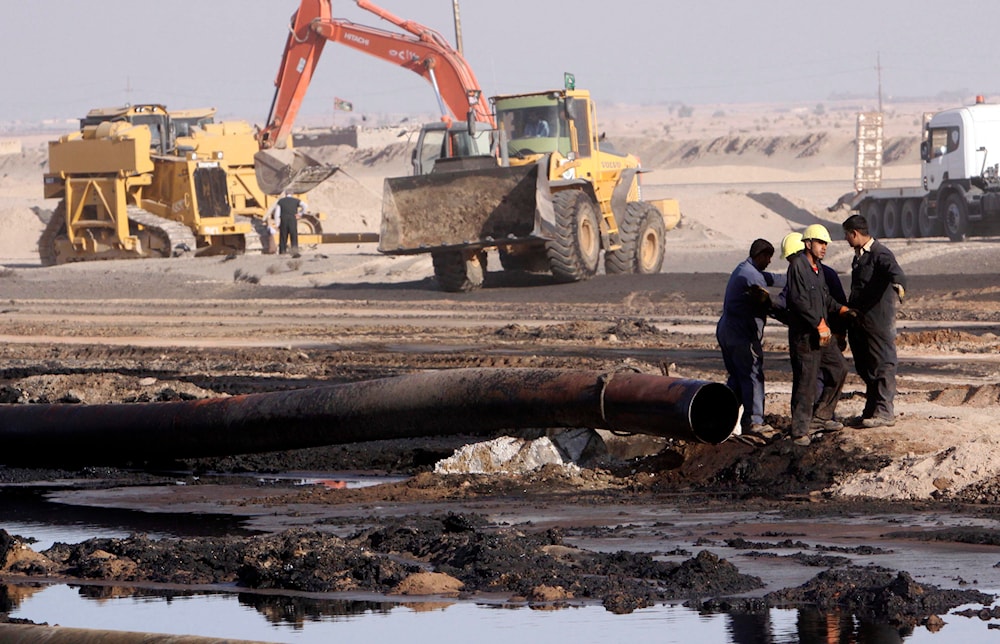Iraq repairs pipeline to Turkey as Kurdish talks stall: Reuters
Iraq's deputy Oil Minister says that the pipeline is likely to be operational and ready to restart flows by the end of this month.
-

In this December 14, 2011 file photo, workers repair oil pipelines at Rumaila oil fields, near the southern Iraqi city of Basra. (AP)
Baghdad is fixing a pipeline that has been closed for a decade, which could permit it to send 350,000 barrels per day (bpd) to Turkey by the end of the month, an Iraqi Deputy Oil Minister said today, which Reuters reported as a step likely to vex foreign oil companies and the Kurdistan Regional Government (KRG).
Speaking with Reuters, the Iraqi Deputy Oil Minister for upstream affairs, Basim Mohammed said "Repair works are ongoing and a major crude pumping station with storage facilities has been completed. The pipeline is likely to be operational and ready to restart flows by the end of this month."
He added that the first stage of operations to restore the pipeline to full capacity is to fix damaged sections inside Iraq and complete one essential pumping station.
Three sources from the state-run North Oil Company (NOC) revealed that leakage was discovered in some segments through the crude test pumping that began early last week to check the parts of the pipeline that run inside Iraqi territories, Reuters reported.
To repair the damaged sections that run from Kirkuk through the provinces of Salahuddin and Mosul to the border area with Turkey, the Iraqi technical NOC crews have accelerated repair operations.
Part of the ITP operations
Speaking on the condition of anonymity to Reuters, two Iraqi oil officials and a government energy advisor revealed that Baghdad did not agree to a Kurdish request for the federal government to pay a $6 per barrel transit fee to Russian oil firm Rosneft, which partly owns the pipeline.
The sources also revealed that the agreement between Baghdad and Ankara on the Iraq-Turkey oil pipeline (ITP) operations was expanded in 2010 for 15 years and will expire in mid-2025.
The government energy advisor added that the continuation of operations at the old pipeline will be discussed as part of talks to expand the (ITP) agreement.
Why this will rile Kurdistan
As the talks between Baghdad and the KRG on the continuation of exports are stalled, Reuters said that the relaunch of the Kirkuk-Ceyhan pipeline would offer a rival route to a pipeline from the Kurdistan region that has been closed down for a year.
Baghdad considers production-sharing agreements between Kurdistan and foreign companies using the KRG pipeline illegal, Reuters added.
This will lead to Iraq's government requesting oil companies to negotiate with it and sell their oil via this pipeline to Turkey, which will affect Kurdistan as it depends almost entirely on oil revenue, Reuters elaborated.
US working with Iraq, Turkey, and Kurds on reopening the ITP pipeline
The US said is collaborating with Iraqi, Turkish, and Kurdistan's region authorities to reopen the Iraq-Turkey oil pipeline, US Assistant Secretary of State for Energy Resources Geoffrey Pyatt announced on March 27.
Pyatt called the reopening of the pipeline “an energy asset that the United States very much wishes to see brought back online."
According to Pyatt, the ITP pipeline is vital to the sustainability of the Iraqi Kurdistan region's energy economy and the crude oil it provides to global, primarily European, markets.
The secretary of state remarked that the US supports cooperation between Iraq and global oil businesses.

 3 Min Read
3 Min Read








